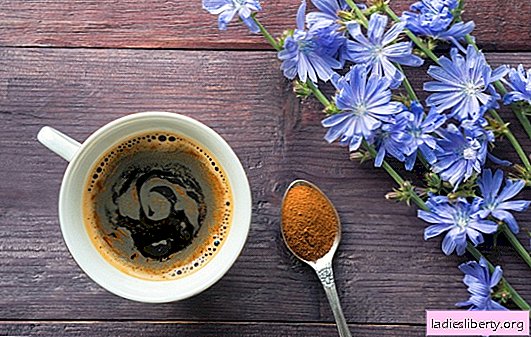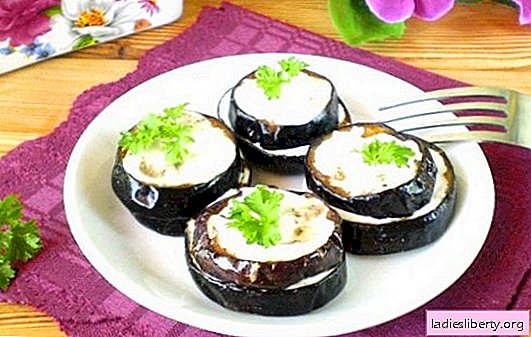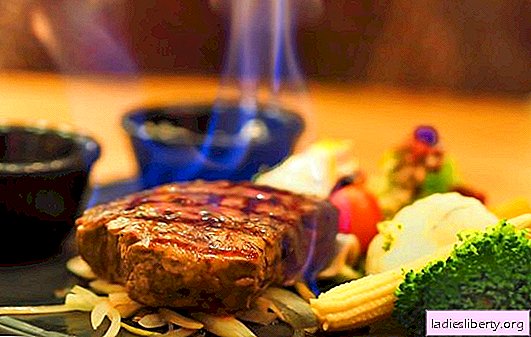
Common chicory is a perennial herb that has been used as a substitute for coffee since Napoleon. Choline, inulin and scopoletins are one of many substances that stimulate the metabolism of the intestines and nervous system.
Flowers, leaves and roots of chicory are used in both modern and folk medicine. Flowers and leaves are harvested in July and August, and the root is harvested in late autumn.
Chicory is still used to treat diseases of the stomach, liver and intestines. At the same time, the doctor prescribes the doses and duration of treatment!
A useful coffee substitute, according to some researchers, reduces the likelihood of bowel cancer.
Healing properties
The main active ingredients are inulin and choline. Inulin strengthens a healthy intestinal flora, while choline reduces the deposition of fat in the body and reduces pressure.
Bitter substances stimulate salivation and secretion of bile. The diuretic effect is due to the high potassium content.
Bitter substances excite receptors in the taste buds at the base of the tongue.
As soon as a person feels bitterness in the tongue, the production of salivary, gastric and bile juices is reflexively stimulated.
Saliva is very important for digestion. It contains tiny proteins - the enzyme α-amylase - which break down sugars (carbohydrates) and makes them more digestible. In addition, saliva contains the so-called "mucins."
Mucins are mucus that makes food slippery, so it moves better through the digestive system. That is why it is so important to chew food for a long time - digestion begins in the mouth.
Bile is part of the liver and is especially important for the digestion of fat. When food enters the mouth, the body “informs” the liver. In response, she produces bile juice, which supports digestion. When eating foods high in fat, this mechanism may be impaired.
As a result, dietary fat is too slowly absorbed by the small intestine in the body. If chicory is used during meals, symptoms can be significantly reduced.
Bitter substances actively stimulate the production of bile juices. However, it is important to note that chicory is not recommended for drinking with gallstones.
In addition to its digestive properties, it has another beneficial effect on the liver. Chicory can stimulate the formation of an important liver enzyme (cytochrome p450).
It has been proven that this liver enzyme removes external and internal toxins from the liver. Chicory protects the liver not only from numerous toxic substances, but also stimulates the regeneration of liver cells (hepatocytes).
Patients who often need to take antibiotics or anti-cancer drugs should use chicory after a MANDATORY consultation with a doctor!
In Egyptian folk medicine, chicory root is used to treat heart palpitations.
Externally, the plant is prescribed for the general treatment of skin diseases and eczema.
Shredded leaves can be used as an aid in inflammation.
Many other medicinal properties are still being investigated.
However, of greatest scientific interest is "inulin" - a prebiotic.
The benefits of inulin
Inulin can be used as a substitute for starch in the treatment of diabetes because it does not affect blood sugar.
Inulin is not absorbed in the small intestine because people lack a special enzyme (inulinase). It enters the rectum and is decomposed by bacteria to short chain fatty acids.
Inulin actually normalizes the balance between "beneficial" and "harmful" bacteria. Lactobacilli process inulin into various acids, which are harmful to harmful bacteria.
However, the resulting gases can lead to bloating in sensitive people. This is the only known side effect of inulin.
Chicory also acts as a natural appetite suppressant.
If it is taken with food, then a person is saturated faster. In the long run, chicory not only helps reduce body weight, but also prevents bulimia (compulsive overeating).
Coffee substitute
Roasted root often served as a substitute for coffee. The plant was known in the 17th century, but it received the “instant of glory” under Napoleon Bonaparte. In 1806, the French emperor imposed a continental blockade on England. However, the blockade did not harm England, but there were not enough coffee beans in France and other countries of continental Europe.
Europeans did not despair and began to use chicory as a natural substitute for coffee beans. Around the plant a lot of myths appeared.
According to an old German legend, chicory flowers are the eyes of virgins who are waiting for the return of their loved ones. The legend was described in the novels of Heinrich von Ofterdingen.
Coffee stimulates the psyche due to the content of caffeine, and chicory - due to choline.
Drinks act differently at the chemical level, but equally - at the mental. Clinical studies have confirmed the stimulating effect of chicory.
Therefore, it can be used throughout the day to maintain activity.
The methods of use are very different and, as a rule, depend on the preferences of the person.
Application methods
The decoction is used for digestive problems. It is recommended to pour chicory root with boiling water. Let it brew for 5 to 8 minutes. Leave for 5-10 minutes in the open air, strain and drink in the form of tea.
In the form of a poultice, in combination with other plants, chicory is applied to wounds, warts or inflammations.
Exotic way: mix Chinese ginseng with chicory. Ginseng root enhances the effects of chicory, so a stronger stimulating effect is achieved.
Caution is recommended for patients with high blood pressure. In small doses, ginseng practically does not affect pressure, but in large doses it can increase it.
Unlike coffee, neither ginseng nor chicory affect the heartbeat.











